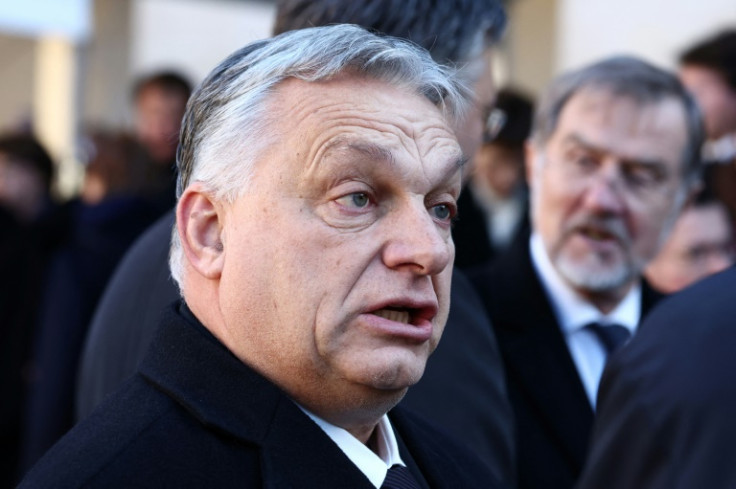
Tempers flaring and accusations of blackmail: sparks flew again Monday between Hungary and its EU partners, three days before a summit meeting aimed at freeing up billions in aid for war-torn Ukraine.
Hungary's nationalist Prime Minister Viktor Orban, who has maintained close ties to the Kremlin since Russia invaded its pro-Western neighbour, vetoed a four-year, 50 billion euro ($54 billion) EU aid package for Kyiv back in December.
Orban's stance has left the European Union scrambling to secure a financial lifeline for Ukraine, made even more crucial with the US Congress deadlocked over future funds for the war effort, which is about to enter its third year.
In Brussels, officials have all but run out of patience with Orban and his brinksmanship over issues ranging from Ukraine and NATO to EU-mandated reforms at home.
EU lawmakers have repeatedly likened his demands to "blackmail".
"It's no coincidence that the EU member state that most often violates our shared values, that violates the rule of law, meaning Hungary, is also the member state that is consistently outside the EU consensus over aid to Ukraine," Anna Luehrmann, Germany's minister for Europe, told reporters.
Luehrmann called it "absolutely unacceptable" that Hungary was also holding out on ratifying Sweden's membership in NATO, having suggested the fellow EU state should "negotiate" to win its backing.
She urged the European Union to "harden" the tools at its disposal to bring Hungary into line.
One option is a mechanism allowing it to cut off EU funds. Another is a procedure under Article 7 of the EU treaty that can strip members of voting rights in the European Council, which decides EU matters.
Hungary is holding out for the EU's plan to give Ukraine support over a four-year period to be subject to an annual review.
But that is a non-starter for fellow EU members, who suspect Orban would seek to use that as leverage year after year -- making the outcome of Thursday's extraordinary summit uncertain.
The Financial Times reported Monday that a confidential proposal circulating in Brussels called for shutting off all EU funding to Budapest, with the aim of spooking investors and sabotaging Hungary's fragile economy, should it refuse to play ball.
The report drew a furious response from Budapest.
"Hungary does not give in to blackmail!" Hungary's EU minister Janos Boka wrote on X, insisting that Budapest sought to "participate constructively" in discussions.
Budapest said Monday that it had submitted a new "compromise" proposal in preparation for the summit.
The FT's report was downplayed by an EU official, who called it a "background note" on "the current status of the Hungarian economy" and "does not reflect the status of the ongoing negotiations".
"The background document does not outline a plan but makes a suggestion that is not in line with the course of action of negotiations," the official said.
But the suggestion that EU leaders were even contemplating such a step raised eyebrows in Brussels.
"I think it's a shame if the response to blackmail... is more blackmail," Luxembourg's foreign minister, Xavier Bettel, told reporters.
"I am certain there will be more talks in coming days, including with Viktor Orban," he said. "I hope that Hungarians will understand it's to choose on which side of the history they want to be."
Preliminary steps towards invoking Article 7 against Hungary were taken once before, in 2018, and the debate has since resurfaced.
"We shall see whether the leaders have enough patience to negotiate with Viktor Orban, or whether they will undertake this new way by using of Article 7," Vera Jourova, European Commission vice president for values and transparency, told reporters.
The Commission last month approved the release of 10 billion euros for Hungary, but more than twice that amount remains frozen pending progress on issues including academic freedom, LGBTQ rights and protection for asylum seekers.
Orban is demanding the full amount be released without delay.







